The Questions That Matter
如何提出好的问题英语作文
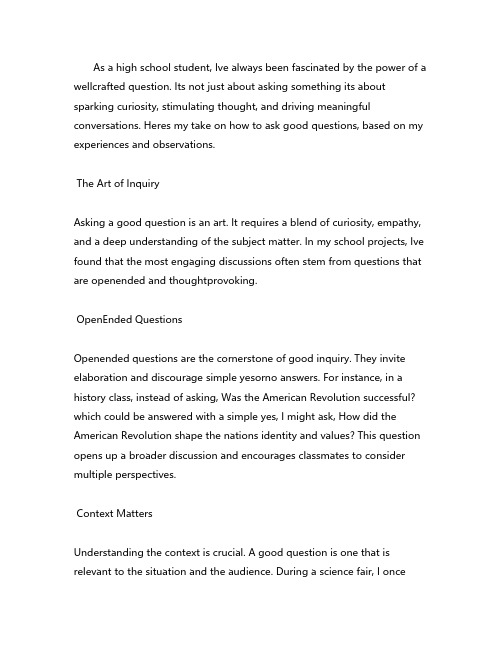
As a high school student, Ive always been fascinated by the power of a wellcrafted question. Its not just about asking something its about sparking curiosity, stimulating thought, and driving meaningful conversations. Heres my take on how to ask good questions, based on my experiences and observations.The Art of InquiryAsking a good question is an art. It requires a blend of curiosity, empathy, and a deep understanding of the subject matter. In my school projects, Ive found that the most engaging discussions often stem from questions that are openended and thoughtprovoking.OpenEnded QuestionsOpenended questions are the cornerstone of good inquiry. They invite elaboration and discourage simple yesorno answers. For instance, in a history class, instead of asking, Was the American Revolution successful? which could be answered with a simple yes, I might ask, How did the American Revolution shape the nations identity and values? This question opens up a broader discussion and encourages classmates to consider multiple perspectives.Context MattersUnderstanding the context is crucial. A good question is one that is relevant to the situation and the audience. During a science fair, I onceasked, What are the implications of your research on future environmental policies? This question was not only pertinent to the project being presented but also connected it to a larger, realworld issue.Clarity and SpecificityClarity is key. A question should be clear and specific to avoid confusion. In a literature class, I learned the importance of precision when I asked, How does the use of symbolism in To Kill a Mockingbird contribute to the novels exploration of innocence and prejudice? This specific question led to a deep analysis of the text, rather than a vague discussion about the books themes.Encouraging Critical ThinkingA good question should challenge assumptions and encourage critical thinking. In a debate club, I once posed the question, Do the benefits of social media outweigh the potential risks to mental health? This question stimulated a lively debate, with participants examining both the positive and negative aspects of social media use.Reflecting on Personal ExperiencesSometimes, the best questions come from personal experiences. When I volunteered at a local community center, I asked, What can we do to better support the needs of our community members? Drawing from my firsthand observations, this question led to actionable ideas and initiatives.Research and PreparationBefore asking a question, its important to do your homework. Research the topic thoroughly to ensure your question is informed and insightful. For a school presentation on renewable energy, I spent hours reading up on the latest technologies and trends, which allowed me to ask, How can we overcome the current barriers to widespread adoption of solar power?Listening and AdaptingA good question is also about listening and adapting. In a group discussion, I learned to listen carefully to the responses and refine my questions accordingly. If a classmates answer hinted at a deeper issue, I would follow up with a more probing question to delve further into the topic.Embracing ComplexityFinally, a good question embraces complexity. It acknowledges that there are often no easy answers. In a philosophy class, I asked, Can absolute truth exist in a world of diverse perspectives? This question sparked a rich, nuanced conversation about the nature of truth and knowledge.In conclusion, asking good questions is a skill that can enhance learning, foster understanding, and promote meaningful dialogue. Its about being curious, empathetic, and thoughtful. By asking questions that areopenended, contextually relevant, clear, and thoughtprovoking, we can unlock new insights and perspectives. As I continue my academic journey, I strive to refine this skill, recognizing its power to shape the way we think, learn, and engage with the world around us.。
大学英语第一册翻译-汉译英

TranslationUnit One1.这个婴儿还不会爬,更不要说会走了。
The baby can't even crawl yet, let alone walk!2. 威尔声称谋杀案件发生时他正在与一群朋友吃饭,但是我认为他在说谎。
Will claimed he was dining with a group of friends at the time of the murder, but in my opinion he told a lie.3. 一定程度上阅读速度与阅读技巧密切相关;有了阅读技巧,你就可以更好的应对课外阅读了。
To a certain extent the speed of reading is closely related to reading skills; and with reading skills you can cope with outside class reading better.4. 根据规则他俩都可以参加比赛。
According to the regulation/rule, they both can play the game/participate in the game.5. 有些人想当然的认为日语中的每一个词在汉语中都有对应的词语。
Some people assume that there is a Chinese equivalent for every Japanese word.6. 我们都已将所有的相关信息告知了警方。
We have passed all relevant information on to the police.7. 关于那件事你问我在多的问题也没有用,因为我是不会回答你的。
There is no use asking me any more questions about that matter because I won't answer.8. 事先没有仔细阅读合同就签了名是吉姆的错误。
精读资料
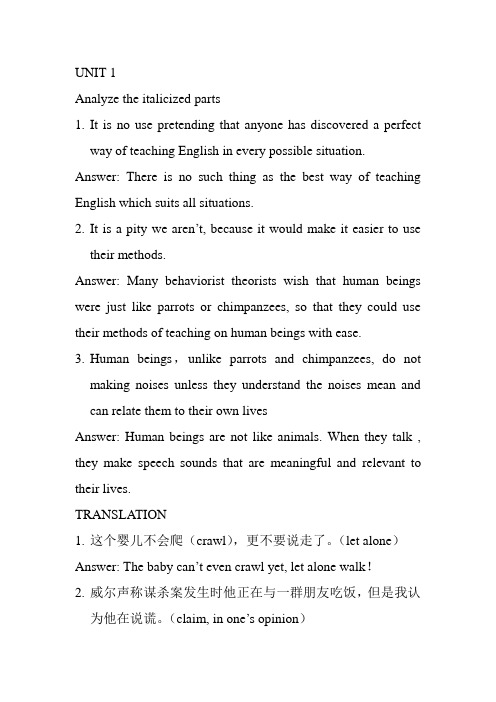
UNIT 1Analyze the italicized parts1.It is no use pretending that anyone has discovered a perfectway of teaching English in every possible situation. Answer: There is no such thing as the best way of teaching English which suits all situations.2.It is a pity we aren’t, because it would make it easier to usetheir methods.Answer: Many behaviorist theorists wish that human beings were just like parrots or chimpanzees, so that they could use their methods of teaching on human beings with ease.3.Human beings,unlike parrots and chimpanzees, do notmaking noises unless they understand the noises mean and can relate them to their own livesAnswer: Human beings are not like animals. When they talk , they make speech sounds that are meaningful and relevant to their lives.TRANSLATION1.这个婴儿不会爬(crawl),更不要说走了。
(let alone)Answer: The baby can’t even crawl yet, let alone walk!2.威尔声称谋杀案发生时他正在与一群朋友吃饭,但是我认为他在说谎。
英语人教版八年级下册unit1
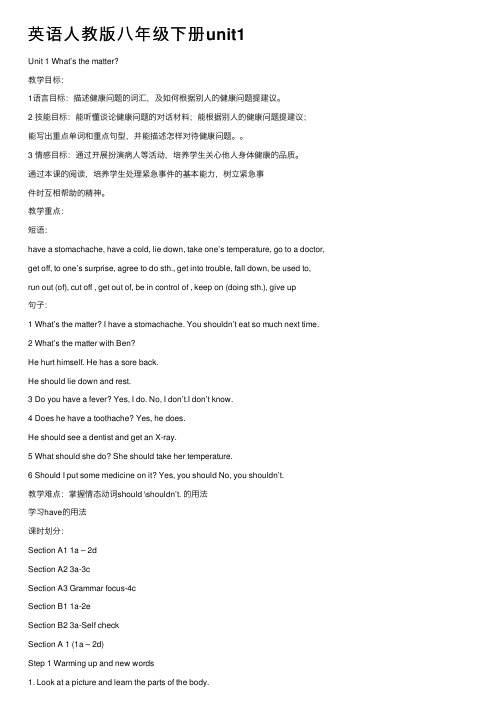
英语⼈教版⼋年级下册unit1Unit 1 What’s the matter?教学⽬标:1语⾔⽬标:描述健康问题的词汇,及如何根据别⼈的健康问题提建议。
2 技能⽬标:能听懂谈论健康问题的对话材料;能根据别⼈的健康问题提建议;能写出重点单词和重点句型,并能描述怎样对待健康问题。
3 情感⽬标:通过开展扮演病⼈等活动,培养学⽣关⼼他⼈⾝体健康的品质。
通过本课的阅读,培养学⽣处理紧急事件的基本能⼒,树⽴紧急事件时互相帮助的精神。
教学重点:短语:have a stomachache, have a cold, lie down, take one’s temperature, go to a doctor, get off, to one’s surprise, agree to do sth., get into trouble, fall down, be used to, run out (of), cut off , get out of, be in control of , keep on (doing sth.), give up句⼦:1 What’s the matter? I have a stomachache. You shouldn’t eat so much next time.2 What’s the matter with Ben?He hurt himself. He has a sore back.He should lie down and rest.3 Do you have a fever? Yes, I do. No, I don’t.I don’t know.4 Does he have a toothache? Yes, he does.He should see a dentist and get an X-ray.5 What should she do? She should take her temperature.6 Should I put some medicine on it? Yes, you should No, you shouldn’t.教学难点:掌握情态动词should \shouldn’t. 的⽤法学习have的⽤法课时划分:Section A1 1a – 2dSection A2 3a-3cSection A3 Grammar focus-4cSection B1 1a-2eSection B2 3a-Self checkSection A 1 (1a – 2d)Step 1 Warming up and new words1. Look at a picture and learn the parts of the body.2. New words and phrases.Step 2 Presentation1a Look at the picture. Write the correct letter [a-m] for each part of the body.___arm ___ back ___ ear ___ eye ___ foot ___hand ___ head ___ leg ___ mouth ___ neck ___nose ___ stomach ___ toothKeys: h e g i h a j l c d m k fStep 3 Listening1b Listen and look at the picture. Then number the names 1-5Listen to the conversations again and fill in the blanks.Conversation 1Girl: I ___________.Conversation 2Boy: I _________________.Conversation 3Boy: I _________________.Conversation 4Girl: I _________________.Conversation 5Betty: What’s the matter, Judy?Ann: She __________________.Keys: have a coldgot a stomachachehave a sore backhave a toothachehas a sore throatStep 4 Speaking1c Look at the pictures. What are the students’ problems? Make conversations.ExamplesA: What’s the matter with Judy?B: She talked too much yesterday and didn’t drink enough water.She has a very sore throat now.A: What’s the matter with Sarah?B: She didn’t take care of herself on the weekend. She was playing with her friends at the park yesterday. Then it got windy, but she didn’t put on her jacket.Now she has a cold.Step 5 Guessing gamesGuess what has happened to the students by using the important sentences.Step 6 Listening2a Listen and number the pictures [1-5] in the order you hear them.Keys: 2 4 3 1 52b Listen again. Match the problems with the advice.1 fever a lie down and rest2 stomachache b drink some hot tea3 cough and sore throat c see a dentist and get an X-ray4 toothache d take your temperature5 cut myself e put some medicine on itKeys: d a b c eStep 7 Speaking2c Make conversations using the information in 2a and 2bA: What’s the matter?B: My head feels very hot.A: Maybe you have a fever.B: What should I do?A: You should take your temperature.Step 8 Role–play1. Imagine you are the school doctor. A few students have health problems. Role-playa conversation between the doctor and the students.2d Role –play the conversation2. Answer the questions.1) What’s the matter with Lisa?2) Did she have a fever?3) What did she do the night before?4) What does she need to do?5) What should she do for now?6) What should she do if things don’t get better?Keys: She has a headache and can’t move her neck.No, she didn’t.She played computer games all weekend.She needs to take breaks away from the computer.She should lie down and rest.She should go to a doctor.Step 9 Language points and summary1. What’s the matter?What’s the matter? 与What’s wrong? 同义,均意为“怎么了?”,常⽤来询问疾病、事故伤害等。
Chapter5what'sthematter(课件)朗文英语世界五年级下册

Key Structures
… told me to …
We can use ‘… told me to …’ to tell someone about something that another person said.
W Dreinakr amomraeskw.ater.
Don’t change the verb form after ‘to’.
1
Fill in the blank. What‘s the matter?
_I_’_ve__g_ot__ a headache.
Let’s try!
Key Structures
2
Fill in the blanks. _W__h_a_t’_s _t_he__m_a_t_te_r_?_
_I_’_ve__go_t__ a stomachache.
Class Content
Period 1: Key Words & Key Structures Period 2: Reading & Comprehension Period 3: Reading & Comprehension Period 4: Practice 1 Period 5: Practice 2 Period 6: Phonics & Fun Corner
medicine and rest in bed.
Amy
ቤተ መጻሕፍቲ ባይዱ
Candy
Key Structures What is your name?
What’s the matter? I’ve got a headache. The doctor told me to drink more water.
课本翻译答案

Unit 1翻译P31-321. The judge asked the reporters not to disclose the name of the victim.法官要求记者不要公开受害人的姓名。
2.The teacher took pains to make sure that we all understood what he said.老师费尽苦心务使我们全部都理解他说的话。
3. Recently the school conducted a survey among those students who have attained academic excellence.最近学校在学业优秀的学生中进行了一项调查4.He said he would accept the job, so we asked him to confirm his acceptance by writing us a letter.他说他要接受这份工作,我们要求他写封信证实5.George studies very hard. He wants to make the most of his chance to learn.乔治学习很努力,他要尽量利用学习的机会6.We can’t go. To begin with, it’s too cold. Besides, we’re busy.我们不能去。
第一,天太冷。
另外我们正忙着7.It’s about time that someone spoke up for these basic truths.该是有人公开讲清这些基本事实的时候了8.You should be working instead of lying there in bed at this time of the day.此时此刻你应该工作而不该在床上躺着9.I’ll jot down some notes while he’s speaking.他发言时,我要记些笔记。
【9A文】新视角研究生英语读说写2课文原文加翻译及课后答案

新视野研究生英语读说写2英语原文加翻译及课后答案1.大学课堂:还有人在听吗?Towardthemiddleofthesemester,Fowkesfellillandmissedaclass.Whenhereturned,theprofessornoddedvaguelRan d,toFowkes’sastonishment,begantodelivernottheneRtlectureinthesequencebuttheoneafter.Hadhe,infact,lecturedtoan emptRhallintheabsenceofhissolitarRstudent?FowkesthoughtitperfectlRpossible.在学期中间,Fowkes因病缺了一次课。
他回到课堂的时候,教授毫无表情地向他点了点头。
接着令Fowkes大吃一惊的是,教授并没有按照顺序讲下一课,而是讲了后面一课。
难道他真的在他唯一的学生缺席的情况下对着空教室讲了一课?Fowkes认为这太有可能了。
TodaRAmericancollegesanduniversities(originallRmodeledonGermanones)areunderstrongattackfrommanRqu arters.Teachers,itischarged,arenotdoingagoodjobofteaching,andstudentsarenotdoingagoodjoboflearning.Americanb usinessesandindustriessufferfromunenterprising,uncreativeeRecutiveseducatednottothinkforthemselvesbuttomouth outdatedtruismstherestoftheworldhaslongdiscarded.Collegegraduateslackbothbasicskillsandgeneralculture.Studiesa reconductedandreportsareissuedonthestatusofhighereducation,butanRchangesthatresulteitherarelargelRcosmeticor makeabadsituationworse.今天美国的大学(原本是以德国的大学为模型的)受到了各方面的严厉指责。
有关学习上遇到困难向你求助英文作文
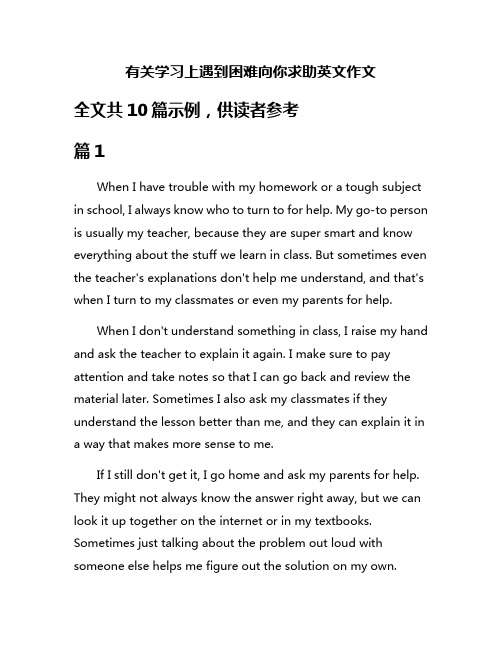
有关学习上遇到困难向你求助英文作文全文共10篇示例,供读者参考篇1When I have trouble with my homework or a tough subject in school, I always know who to turn to for help. My go-to person is usually my teacher, because they are super smart and know everything about the stuff we learn in class. But sometimes even the teacher's explanations don't help me understand, and that's when I turn to my classmates or even my parents for help.When I don't understand something in class, I raise my hand and ask the teacher to explain it again. I make sure to pay attention and take notes so that I can go back and review the material later. Sometimes I also ask my classmates if they understand the lesson better than me, and they can explain it in a way that makes more sense to me.If I still don't get it, I go home and ask my parents for help. They might not always know the answer right away, but we can look it up together on the internet or in my textbooks. Sometimes just talking about the problem out loud with someone else helps me figure out the solution on my own.No matter what, I always make sure to ask for help when I need it. It's important to not give up when things get tough, and to keep trying until you find a solution. So don't be afraid to ask for help when you need it, because there are always people who can support you and help you succeed in your learning journey.篇2Hey guys, have you ever had trouble with your schoolwork and felt like you just couldn't figure it out on your own? Well, I sure have! When I get stuck on a problem or don't understand something in class, I always ask for help.One time, I was doing my math homework and I just couldn't solve this tricky problem. I tried and tried, but I just couldn't figure it out. So, I decided to ask my teacher for help. I raised my hand and said, "Excuse me, can you help me with this problem? I'm really stuck."My teacher came over and patiently explained the problem to me in a way that I could understand. She showed me a new strategy for solving it, and I was able to finish my homework with no problem. I was so relieved and grateful for her help!I've also asked my classmates for help when I'm struggling with a subject. Sometimes, they understand things in a differentway than I do, and they can explain it in a way that makes sense to me. It's always good to have friends who can help you out when you need it.So, remember, it's okay to ask for help when you're having trouble with your schoolwork. Your teachers, classmates, and even your parents are there to support you and help you succeed. Don't be afraid to raise your hand and ask for help –you'll be glad you did!篇3Title: Asking for Help When Facing Difficulties in LearningHey everyone! Today I want to talk about something really important: asking for help when we are having a hard time with our studies. It's totally okay to feel stuck or confused sometimes, and it's super important to ask for help when we need it.First of all, we should never feel embarrassed or shy about asking for help. Our teachers and parents are here to support us, and they want us to succeed. They are always happy to help us understand difficult concepts or solve tricky problems. So don't be afraid to raise your hand in class or schedule a time to talk with your teacher after school.If you feel more comfortable talking with your classmates or friends about your struggles, that's okay too! They might be able to explain things in a way that makes more sense to you, or they might have tips and tricks that can help you remember things better. Just remember to always be respectful and kind when asking for help from others.Another great option is to use online resources like educational websites and videos. Sometimes hearing things explained in a different way can really help us understand better. There are also lots of apps and games that can make learning more fun and interactive. Just make sure to ask your parents for permission before using any new online resources.In conclusion, it's important to remember that asking for help is a sign of strength, not weakness. We all have our strengths and weaknesses, and there's nothing wrong with needing a little extra support sometimes. So don't be afraid to reach out for help when you need it – you'll be amazed at how much better you can do when you have the support you need.That's all for now, friends. Remember, it's okay to ask for help when you're struggling with your studies. Stay curious and keep learning! Bye for now!篇4When we are learning something new, we may encounter difficulties that we can't solve by ourselves. At this time, it's important to ask for help.There was a time when I was learning a new math concept and I just couldn't understand it no matter how hard I tried. I felt frustrated and worried that I would never be able to figure it out. Then I remembered that it's okay to ask for help when we don't understand something. So, I decided to ask my teacher for help.I went up to my teacher after class and told her about the problem I was having. She patiently explained the concept to me in a different way, and suddenly it all made sense. I felt so relieved and grateful that I had asked for help.From this experience, I learned that it's okay to ask for help when we are struggling with something. Teachers are there to help us and they want us to succeed. So don't be afraid to raise your hand and ask questions when you need help. It's better to ask for help and understand the material, than to struggle alone and fall behind.So, remember, when you're faced with a difficult problem in your studies, don't be afraid to ask for help. Your teachers,parents, and classmates are there to support you. Asking for help is a sign of strength, not weakness. Keep learning and growing, and remember that it's okay to seek assistance when you need it.篇5When I have difficulties in my study, I always seek help from my teachers or parents. They are always there for me and are willing to help me with any problems I encounter.Sometimes, I find it hard to understand some new concepts in class. So, I raise my hand and ask my teacher to explain it to me again. They are always patient and willing to help me until I fully understand the lesson. I am grateful for their guidance and support.At home, my parents also play an important role in helping me with my studies. Whenever I have homework or assignments that I find challenging, they sit down with me and explain the questions to me step by step. They encourage me to never give up and always try my best.When I am struggling with a subject or a topic, I often turn to my classmates for help. We discuss the problems together and try to find solutions. It is fun to study together and learn from each other.In conclusion, it is important to seek help when we encounter difficulties in our studies. It is okay to ask questions and seek guidance from our teachers, parents, and classmates. With their support, we can overcome any obstacles and succeed in our learning journey.篇6When I have trouble with my school work, I always ask for help from my teacher or my parents. Sometimes, I feel like giving up when I can't understand something, but I know it's important to keep trying and ask for help.One time, I was struggling with my math homework. It was really hard for me to solve the problems and I felt so frustrated. I didn't know what to do, so I asked my teacher for help. She sat down with me and explained things in a way that I could understand. I felt so much better after that and was able to finish my homework.Another time, I was having trouble with my spelling words. I kept getting them wrong and it was really frustrating. I asked my mom to help me study and she came up with some fun ways to practice. We played games and made up silly sentences usingthe words. It made studying more fun and I was able to remember the words better.So, I've learned that it's okay to ask for help when you're having trouble with something. It doesn't mean you're not smart, it just means you need a little extra help. And that's totally okay. So, whenever you're feeling stuck, just remember to ask for help. It can make a big difference!篇7Hey guys, have you ever struggled with a difficult subject in school and didn't know what to do? Well, I have, and I want to share my experience with you.Last week, I was having a really hard time with my math homework. I just couldn't understand how to solve the problems no matter how much I tried. I felt so frustrated and stressed out. I didn't know what to do, so I decided to ask for help. I went to my teacher and told her that I was struggling with the homework. She was really nice and patient with me. She explained the concepts to me in a way that I could understand. She even gave me some extra practice problems to work on.After spending some time with my teacher, I felt more confident and ready to tackle the homework on my own. Istarted to solve the problems step by step and before I knew it, I had finished the entire assignment. I felt so proud of myself for not giving up and asking for help when I needed it.So remember, guys, it's okay to ask for help when you're struggling with something. Your teachers are there to support you and help you succeed. Don't be afraid to speak up and ask for assistance. You can do it!篇8Hey guys! Today I wanna talk about what to do when we have trouble with our schoolwork and need help. It happens to all of us, right? So don't be shy to ask for help!First of all, don't try to deal with the problem all by yourself. It's totally okay to ask your teacher for help. They are there to help you learn and understand the material. You can ask questions in class, after class, or even send them an email if you are too shy to ask in person.If you don't feel comfortable asking your teacher, you can always ask a classmate for help. Maybe they understand the topic better than you and can explain it in a way that makes sense to you. Plus, working with a friend can make studying more fun!There are also lots of resources available online to help you with your schoolwork. You can search for tutorials, videos, or websites that explain the concept you are struggling with. Sometimes hearing it explained in a different way can make things click in your brain.And remember, it's important to stay positive and keep trying. Don't get discouraged if you don't understand something right away. Learning takes time and practice, and it's okay to make mistakes along the way.So next time you're stuck on a problem or confused about a topic, don't be afraid to ask for help. Everyone needs a little help sometimes, and it's nothing to be ashamed of. Keep working hard and you'll get through it! Good luck, guys!篇9Title: Can You Help me with my Homework?Hey guys! I wanna tell you about this time when I was really struggling with my homework. It was so hard and I just didn't know what to do. But you know what? I asked for help and everything got better!I was working on my math homework and there was this one problem that I just couldn't figure out. I tried and tried, but I kept getting it wrong. I was getting so frustrated and I didn't know what to do. That's when I remembered that it's okay to ask for help.So I went to my friend Sarah and asked her if she could help me with the problem. And you know what? She totally did! She explained it to me in a different way and suddenly it all made sense. It was like a light bulb went off in my head and I finally understood what I was supposed to do.I felt so relieved and happy that I had asked for help. It made me realize that it's okay to not know everything and it's okay to ask for help when you need it. We're all learning and growing, and sometimes we just need a little help along the way.So the next time you're struggling with your homework or just feeling stuck, don't be afraid to ask for help. You never know, someone might have the answer you're looking for. And remember, it's okay to not have all the answers – that's why we have each other to help us out.篇10Hey guys, have you ever had a hard time when you're studying and really needed help? I bet you have! I want to share with you a story about when I was struggling with my homework and asked for help.So, one day, I was trying to solve a really tricky math problem but just couldn't figure it out. I kept getting the wrong answer no matter how hard I tried. I felt frustrated and upset because I didn't want to let my teacher down. That's when I realized it was okay to ask for help.I decided to talk to my classmate who was really good at math. I explained the problem to him and he was so nice and patient. He showed me a different way to solve it and finally, I understood! I felt so relieved and grateful that I had someone to turn to when I needed help.It can be tough to admit when we don't understand something, but it's important to remember that it's okay to ask for help. Whether it's a friend, a teacher, or a family member, there's always someone willing to lend a hand and help you out. Don't be afraid to speak up and ask for assistance when you need it.Remember, we're all in this together and learning is a journey that we can take together. Don't be afraid to seek helpwhen you're struggling – you'll be surprised at how much better you'll feel once you do. Keep learning and growing, and don't be afraid to ask for help along the way!。
外研社2023新标准职业英语综合教程1教学课件Unit_2
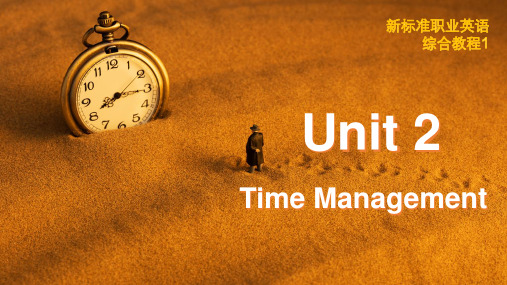
What do(es) the items(s) represent?
What does Mr White suggest?
one’s time
should be managed
1. the tasks that matter most
2. should be done first
3. the tasks that are less important 4. can be done later
• write a work log of your daily tasks.
Learning Context
Communicative scenario
As an administrative assistant at an international IT company, you often have to handle multiple tasks at the same time. One morning, you are busy with the following tasks:
5. ☐ copied the documents for the monthly meeting at 9:00 am
Understanding ideas
Task 2 Complete the following table according to Mr White’s story.
Item(s) Glass Pebbles Water
Developing skills
Rachel messed up the monthly meeting because she lacked experience in time management. The following table may be helpful for her to figure out what her priorities are. In this table, daily tasks can be classified into four types based on importance and urgency, as shown below:
新世纪A1 Unit1-Unit4翻译
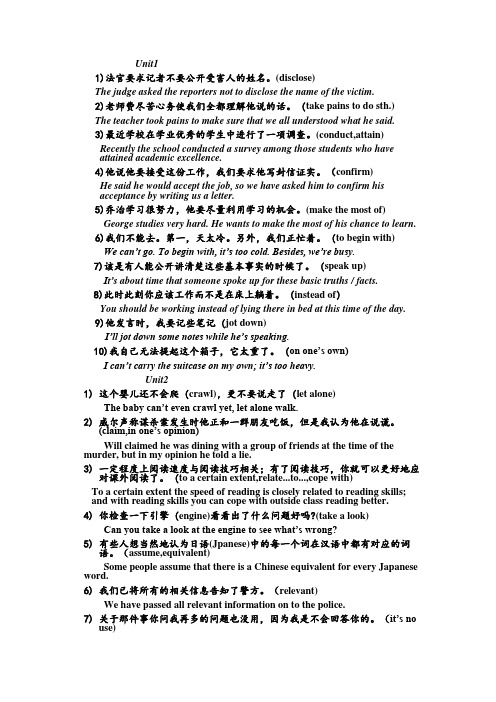
Unit11)法官要求记者不要公开受害人的姓名。
(disclose)The judge asked the reporters not to disclose the name of the victim.2)老师费尽苦心务使我们全都理解他说的话。
(take pains to do sth.)The teacher took pains to make sure that we all understood what he said.3)最近学校在学业优秀的学生中进行了一项调查。
(conduct,attain)Recently the school conducted a survey among those students who haveattained academic excellence.4)他说他要接受这份工作,我们要求他写封信证实。
(confirm)He said he would accept the job, so we have asked him to confirm hisacceptance by writing us a letter.5)乔治学习很努力,他要尽量利用学习的机会。
(make the most of)George studies very hard. He wants to make the most of his chance to learn.6)我们不能去。
第一,天太冷。
另外,我们正忙着。
(to begin with)We can’t go. To begin with, it’s too cold. Besides, we’re busy.7)该是有人能公开讲清楚这些基本事实的时候了。
(speak up)It’s about time that someone spoke up for these basic truths / facts.8)此时此刻你应该工作而不是在床上躺着。
question的汉语是什么意思
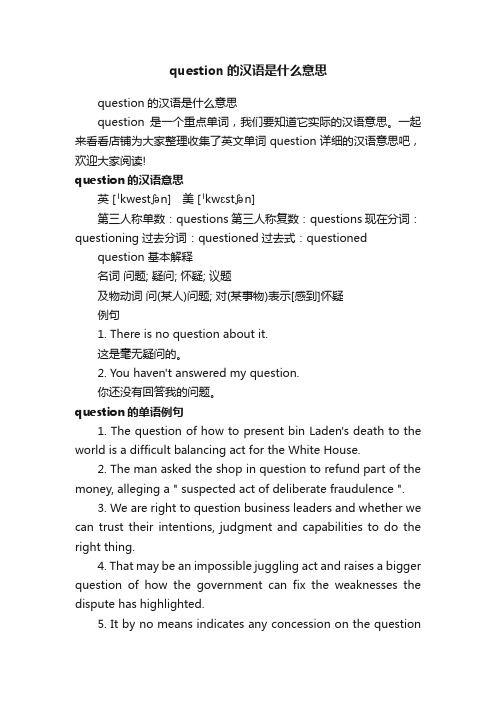
question的汉语是什么意思question的汉语是什么意思question是一个重点单词,我们要知道它实际的汉语意思。
一起来看看店铺为大家整理收集了英文单词question详细的汉语意思吧,欢迎大家阅读!question的汉语意思英 [ˈkwestʃən] 美 [ˈkwɛstʃən]第三人称单数:questions第三人称复数:questions现在分词:questioning过去分词:questioned过去式:questioned question 基本解释名词问题; 疑问; 怀疑; 议题及物动词问(某人)问题; 对(某事物)表示[感到]怀疑例句1. There is no question about it.这是毫无疑问的。
2. You haven't answered my question.你还没有回答我的问题。
question的单语例句1. The question of how to present bin Laden's death to the world is a difficult balancing act for the White House.2. The man asked the shop in question to refund part of the money, alleging a " suspected act of deliberate fraudulence ".3. We are right to question business leaders and whether we can trust their intentions, judgment and capabilities to do the right thing.4. That may be an impossible juggling act and raises a bigger question of how the government can fix the weaknesses the dispute has highlighted.5. It by no means indicates any concession on the questionof national sovereignty, the article said.6. The decision by the Secretary for the Civil Service to allow Leung's appointment to the company also came into question.7. The country's policy on the overseas media was by far the most common question asked by the journalists.8. Critics question whether taxpayers are being put at risk and if expanded safety nets will encourage financial companies to act more recklessly in the future.9. The continuing fear that another calamitous terrorist attack is not out of the question.question的词典解释1. 问题;疑问A question is something that you say or write in order to ask a person about something.e.g. They asked a great many questions about England...他们问了一大堆有关英格兰的问题。
未来以及宇宙探索的英语作文
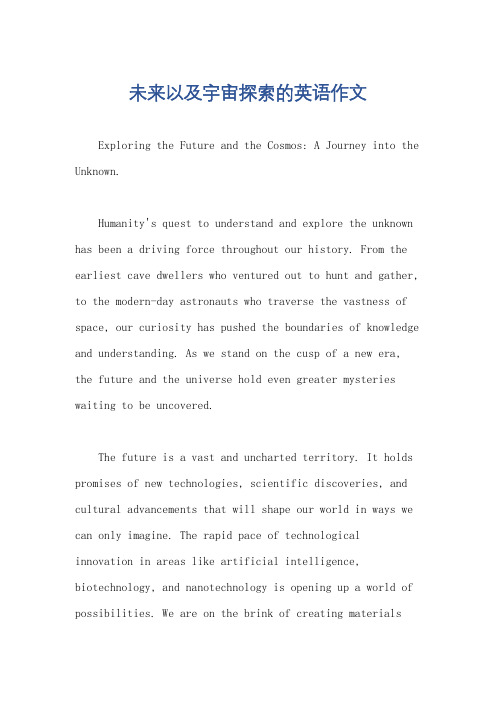
未来以及宇宙探索的英语作文Exploring the Future and the Cosmos: A Journey into the Unknown.Humanity's quest to understand and explore the unknown has been a driving force throughout our history. From the earliest cave dwellers who ventured out to hunt and gather, to the modern-day astronauts who traverse the vastness of space, our curiosity has pushed the boundaries of knowledge and understanding. As we stand on the cusp of a new era, the future and the universe hold even greater mysteries waiting to be uncovered.The future is a vast and uncharted territory. It holds promises of new technologies, scientific discoveries, and cultural advancements that will shape our world in ways we can only imagine. The rapid pace of technological innovation in areas like artificial intelligence, biotechnology, and nanotechnology is opening up a world of possibilities. We are on the brink of creating materialsthat are stronger than steel but lighter than air, and machines that can think and learn like humans. These advancements will revolutionize the way we live, work, and interact with the world.However, the future also brings challenges that we must face. Climate change, resource scarcity, and social inequality are among the pressing issues that demand our attention. As we look towards the future, it is crucialthat we do so with a sense of responsibility and sustainability. We must ensure that our quest for progress does not come at the cost of our planet's health and the well-being of future generations.The universe, on the other hand, is a vast and mysterious expanse that has fascinated humanity for centuries. From the ancient astronomers who charted the movements of the stars to the modern-day space explorers who have walked on the Moon and sent probes to explore the outer reaches of the solar system, our quest to understand the universe has been relentless.The cosmos holds mysteries that are both awe-inspiring and mind-boggling. The existence of dark matter and dark energy, the possibility of multiple universes, and the question of whether we are alone in the universe are among the questions that continue to challenge our understanding of the cosmos. With the advancement of telescopes and space exploration technologies, we are poised to answer these questions and unlock the secrets of the universe.However, the exploration of the universe also raises ethical and philosophical questions. As we venture further into the cosmos, we must consider the impact of our actions on other life forms and the environment. We must also grapple with the question of our purpose and place in the universe. Are we mere observers or are we destined to become creators and shapers of the cosmos?In conclusion, the future and the universe are vast and uncharted territories that hold both promise and challenge. As we embark on this journey into the unknown, it iscrucial that we maintain a sense of curiosity, wonder, and responsibility. We must strive to create a future that isbright and sustainable, and to explore the universe with humility and respect. Only then can we hope to unlock the secrets of the future and the universe and create a better world for ourselves and future generations.。
陷入沉思的小作文英语
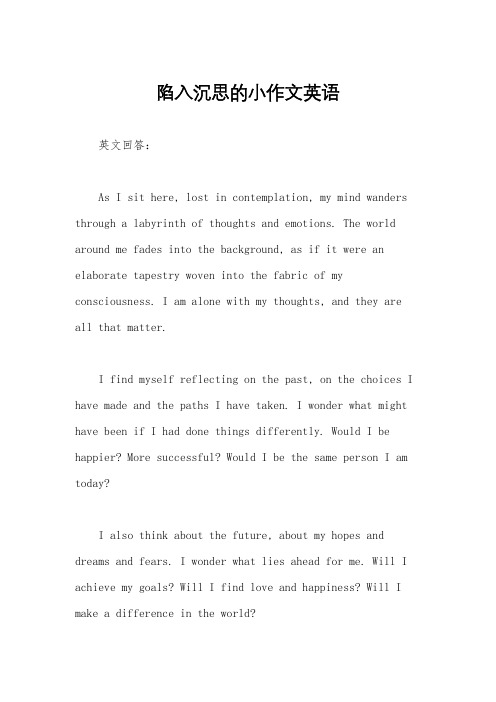
陷入沉思的小作文英语英文回答:As I sit here, lost in contemplation, my mind wanders through a labyrinth of thoughts and emotions. The world around me fades into the background, as if it were an elaborate tapestry woven into the fabric of my consciousness. I am alone with my thoughts, and they are all that matter.I find myself reflecting on the past, on the choices I have made and the paths I have taken. I wonder what might have been if I had done things differently. Would I be happier? More successful? Would I be the same person I am today?I also think about the future, about my hopes and dreams and fears. I wonder what lies ahead for me. Will I achieve my goals? Will I find love and happiness? Will I make a difference in the world?These are the questions that keep me up at night. They are the questions that drive me to be better, to do more, to be more. I know that I cannot control the future, but I can control how I prepare for it. I can control my actions, my thoughts, and my words.I can choose to live a life of purpose and meaning. I can choose to be kind and compassionate. I can choose to make a positive difference in the world. I can choose to be happy.The choice is mine. And as I sit here, lost in contemplation, I know that I will choose wisely.中文回答:我静静地坐在那里,陷入沉思,我的思绪在思想和情感的迷宫中游荡。
再学校活动中你想成为记者,英语作文
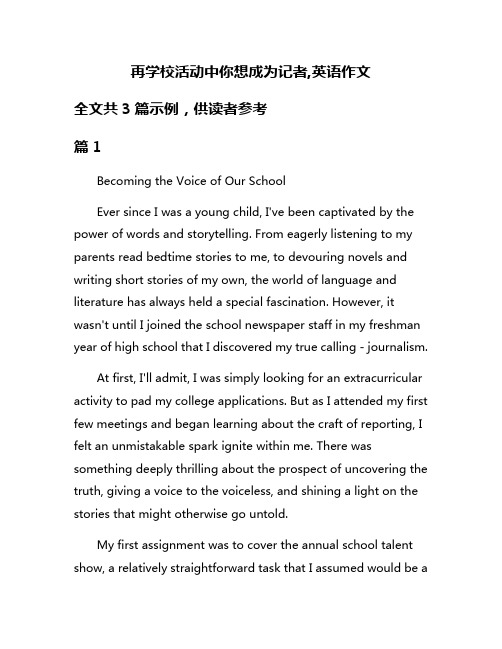
再学校活动中你想成为记者,英语作文全文共3篇示例,供读者参考篇1Becoming the Voice of Our SchoolEver since I was a young child, I've been captivated by the power of words and storytelling. From eagerly listening to my parents read bedtime stories to me, to devouring novels and writing short stories of my own, the world of language and literature has always held a special fascination. However, it wasn't until I joined the school newspaper staff in my freshman year of high school that I discovered my true calling - journalism.At first, I'll admit, I was simply looking for an extracurricular activity to pad my college applications. But as I attended my first few meetings and began learning about the craft of reporting, I felt an unmistakable spark ignite within me. There was something deeply thrilling about the prospect of uncovering the truth, giving a voice to the voiceless, and shining a light on the stories that might otherwise go untold.My first assignment was to cover the annual school talent show, a relatively straightforward task that I assumed would be asimple warm-up exercise. Little did I know that this seemingly mundane event would forever shape my perspective on the role of a journalist. As I sat in the auditorium, scribbling notes and observing the diverse array of acts taking the stage, I realized that each performer had a unique story to tell – a story of passion, dedication, and the courage to step into the spotlight.It was then that I understood the true power of journalism. It wasn't merely about recounting facts and figures, but about capturing the essence of human experience. With each interview I conducted and each article I wrote, I felt a profound sense of responsibility to do justice to the narratives entrusted to me. I learned to ask probing questions, to actively listen, and to craft words in a way that would resonate with readers on a deep, emotional level.As my confidence and skills grew, so too did my ambitions. I began seeking out more complex and thought-provoking stories to cover, from investigating issues of social justice and environmental sustainability to profiling the unsung heroes within our school community. Each article became a canvas upon which I could paint a vivid picture, inviting readers to see the world through a different lens.One of the most memorable experiences during my time on the newspaper staff was our coverage of a controversial decision made by the school administration. Initially, the story seemed straightforward – a policy change that had ruffled some feathers among students and faculty alike. However, as I delved deeper into the matter, I uncovered a complex web of motivations, conflicting perspectives, and underlying systemic issues.It was then that the true challenge of ethical journalism revealed itself to me. How could I present a fair and balanced account while still maintaining journalistic integrity? How could I give voice to all sides without compromising my own values and beliefs? These were the questions that kept me up at night, wrestling with the weight of responsibility that came with being a purveyor of truth.Ultimately, it was this very struggle that solidified my passion for journalism. I realized that true journalistic excellence lay not in merely reporting the facts, but in navigating the nuances, asking the tough questions, and fearlessly shining a light on the complexities of the human experience.As my high school career drew to a close, I found myself reflecting on the countless stories I had had the privilege of telling, the voices I had amplified, and the impact – howeversmall – that my words had made. It was a bittersweet realization, knowing that my time as a student journalist was coming to an end, but also feeling a sense of immense gratitude for the lessons learned and the foundation laid for my future endeavors.Looking ahead, I know that the path of journalism will be fraught with challenges and obstacles. In an era of ever-evolving media landscapes, fake news, and polarized public discourse, the role of a journalist has become more crucial – and more scrutinized – than ever before. But it is precisely this gauntlet that invigorates me, fueling my determination to be a force for truth, transparency, and understanding in a world that so desperately needs it.As I prepare to embark on this next chapter of my journey, I carry with me the invaluable experiences and skills honed during my time on the school newspaper staff. The ability to tell a compelling story, to ask the right questions, to see beyond the surface-level narratives – these are the tools that will guide me as I navigate the complexities of the world beyond the hallways of our alma mater.To my fellow student journalists, both past and present, I say this: never underestimate the power of your words. Every story you tell, every truth you uncover, has the potential to inspirechange, to challenge assumptions, and to bring people together in a shared understanding of our beautifully complex world.And to those who have yet to discover the thrill of journalism, I encourage you to take the leap. Immerse yourself in the stories that matter, seek out the voices that need to be heard, and never shy away from asking the difficult questions. For it is in the pursuit of truth, no matter how elusive or uncomfortable, that we find our purpose as storytellers and bearers of light in a world that often seems cloaked in darkness.Journalism is not just a profession; it is a calling, a sacred duty to be the voice of our school, our community, and ultimately, our world. And as I stand on the precipice of this new chapter, I feel a profound sense of gratitude for having had the opportunity to hone my craft and discover my passion within the nurturing confines of our school walls.To all those who have supported me on this journey, I say thank you. Your encouragement, your guidance, and your belief in me have been the fuel that has propelled me forward. And to the stories yet untold, the truths yet unveiled, I pledge to approach them with the same sense of wonder, integrity, and unwavering commitment that has defined my journey thus far.For in the end, that is the true essence of journalism – to be a beacon of light, illuminating the paths that lead us toward a greater understanding of ourselves and the world we inhabit. And I, for one, cannot wait to embark on that journey, one story at a time.篇2Capturing the Moments: My Journey to Becoming a School Event ReporterAs I navigate the bustling hallways of our esteemed institution, a sense of excitement courses through my veins. The school events, those vibrant occasions that bring our community together, have always fascinated me. From the electrifying energy of pep rallies to the intellectual discourse of academic symposiums, each event holds a unique charm that deserves to be immortalized. It is this realization that has ignited my passion to become a school event reporter.The allure of journalism has captivated me from a young age. Growing up, I found solace in the pages of newspapers and magazines, marveling at the storytellers who could transport readers to distant lands and unfamiliar experiences with the stroke of their pens. The power of words to inform, inspire, andevoke emotions was a revelation that resonated deeply within me.As I entered high school, the opportunity to join the school newspaper presented itself. With trembling hands and a heart brimming with determination, I seized this chance. From that moment on, a transformation began to unfold, one that would shape my journey towards becoming a school event reporter.My first assignment was to cover the annual science fair, a showcase of brilliant young minds and innovative projects. Surrounded by the buzz of eager students and the aroma of scientific curiosity, I felt a surge of adrenaline coursing through my veins. Armed with a notebook and a trusty pen, I embarked on a mission to capture the essence of this event.Interviews flowed like rivulets of knowledge, as I engaged with students, teachers, and esteemed judges. Each conversation unveiled a tapestry of fascinating insights, from the painstaking processes behind groundbreaking experiments to the personal motivations that fueled these young scientists' pursuits. With each word transcribed, I felt a profound sense of responsibility to accurately convey the passion and dedication that permeated the event.As the science fair drew to a close, I retreated to my sanctuary – the school newspaper's office – where the true magic unfolded. Surrounded by the gentle clacking of keyboards and the murmurs of my fellow writers, I wove the threads of my experiences into a captivating narrative. Words danced across the page, painting vivid pictures of the triumphs, challenges, and the indomitable spirit that defined the event.The moment my article was published, a sense of pride and accomplishment washed over me. Seeing my byline etched beneath the headline was a tangible reminder of the power I wielded as a reporter – the power to share stories, to ignite curiosity, and to inspire others.From that pivotal moment, my journey as a school event reporter blossomed. I found myself eagerly anticipating each upcoming occasion, be it a theatrical production, a charity fundraiser, or a prestigious academic competition. With each event, I honed my observational skills, sharpened my interviewing techniques, and refined my writing prowess.The thrill of capturing the raw emotions, the electric atmosphere, and the unfolding narratives became an addiction, fueling my passion for journalism. I reveled in the opportunity toshed light on the remarkable achievements of my peers, amplifying their voices and showcasing their talents to the world.Yet, my role as a school event reporter extended beyond mere chronicling. I saw myself as a bridge, connecting the tapestry of our school community to the broader world. Through my articles, I aimed to inspire prospective students, reignite the nostalgic flames of alumni, and forge a deeper understanding between our institution and the surrounding community.With each event, I encountered challenges that tested my resilience and adaptability. From navigating the chaos of crowded venues to respecting the privacy of individuals, I learned invaluable lessons in ethics, professionalism, and the art of storytelling. These experiences molded me into a more thoughtful and responsible journalist, one who understood the weight of words and the impact they could have on individuals and communities.As my high school journey nears its end, I find myself reflecting on the transformative power of being a school event reporter. It has been a catalyst for personal growth, igniting a passion for journalism that burns brighter than ever before. The skills I have acquired – the ability to communicate effectively, tothink critically, and to tell stories that resonate – are invaluable assets that will undoubtedly shape my future endeavors.Looking ahead, I envision a world where I can continue to be a storyteller, a chronicler of human experiences, and a voice that amplifies the remarkable achievements of individuals and communities. Whether in the realm of traditional journalism or through the ever-evolving digital landscape, my commitment to capturing the essence of events and sharing narratives that inspire and uplift remains steadfast.As I bid farewell to the hallowed halls of my alma mater, I carry with me a treasure trove of memories, each one a vibrant tapestry woven from the threads of school events. From the roar of the crowd at the homecoming game to the hushed reverence of the graduation ceremony, these moments have left an indelible mark on my soul, shaping the journalist I have become and the storyteller I aspire to be.With a notebook in hand and a heart brimming with curiosity, I step forth into the world, ready to embark on a new chapter of my journey as a reporter. The school events may fade into cherished memories, but the lessons they have imparted will forever guide my path, fueling my desire to capture theextraordinary within the ordinary, and to share the stories that illuminate the depths of the human experience.篇3Chasing the Story: My Dream of Being a School JournalistEver since I was a young kid, I've been absolutely obsessed with stories. Whether it was the books my parents would read to me at bedtime or the movies we'd watch together as a family, I was always captivated by the art of storytelling. As I grew older and discovered my love of writing, I realized that journalism could be the perfect blend of my passion for stories and my curiosity about the world around me.When I started at this school a few years ago, I was immediately struck by the vibrant community and all the incredible events and activities happening on a daily basis. From eye-opening guest speaker events to exhilarating sports competitions to thought-provoking art exhibitions and everything in between, there was always a story waiting to be told. That's when the idea of becoming the school journalist took root in my mind.At first, the prospect seemed a bit daunting. After all, journalism is a huge responsibility – you're tasked withobjectively capturing the facts, giving a voice to different perspectives, and shining a light on the truth. But the more I thought about it, the more I felt called to take on this challenge. I wanted to be the one chronicling the remarkable happenings at our school and sharing them with the entire community.I've always believed that stories have the power to inspire, educate, and bring people together. As the school journalist, I could use my writing to spotlight the outstanding achievements of my peers, shed light on important issues affecting students, and foster a stronger sense of community within our institution's walls. Every article would be an opportunity to engage readers and spark meaningful conversations.Of course, becoming an effective journalist is about much more than just putting words on a page. It requires having a natural inquisitiveness, always being willing to ask tough questions, and possessing the ability to look at situations from multiple angles. It's a skill that takes practice, but I'm deeply committed to developing it. After all, truly great journalists don't just report the news – they provide context, add depth, and elevate important narratives that deserve to be heard.Over the past few months, I've made a concerted effort to start honing my journalistic abilities. I've been writing articles forthe school newspaper, covering everything from club fundraisers to sporting events. With each piece, I've aimed to tell a compelling story while sticking to the core tenets of ethical journalism: being fair, maintaining accuracy, and treating all subjects with respect and integrity.One of my favorite experiences so far was covering our school's annual talent show. As I sat in the auditorium, I was totally blown away by the incredible array of singers, dancers, musicians, and other performers who took the stage that night. By interviewing the participants beforehand and weaving their personal stories into my article, I was able to capture the magic of the event in a way thattranscended just listing the acts. Readers could feel the passion, the nerves, the hard work that went into every single performance.Moments like those are when I feel most alive as a writer. There's an indescribable thrill that comes from talking to people, learning about their lives and perspectives, and then crafting their experiences into a coherent narrative to share with others. It's almost like getting to peek behind the curtain and understand what makes the world tick in a deeper way.Of course, the journey to becoming a skilled journalist is an ongoing one that requires constant learning and growth. I have so much more to learn when it comes to interviewing techniques, maintaining objectivity, upholding ethical standards, and finding the perfect way to structure a story. But I'm deeply passionate about this craft and committed to consistently honing my abilities.Looking ahead, my biggest goal is to one day become the editor-in-chief of our school's newspaper. From that position, I could really shape the tone and direction of the publication, ensuring that we're covering the stories that matter most to students. I envision using the paper as a platform to spark meaningful discussions around complex issues, give marginalized voices a place to be heard, and foster a greater sense of community within our school.Additionally, I'd love to start a podcast or video series that provides behind-the-scenes looks at all the incredible events, clubs, and initiatives happening here. There's something powerful about multimedia storytelling that allows you to truly immerse the audience and bring them along for the journey. I want people to feel like they have a front-row seat to everything noteworthy occurring within these walls.Ultimately, my dream is to use journalism as a force for good – to shed light on important issues, amplify unheard voices, and bring people together through the power of shared experiences and stories. Both within the microcosm of this school and out in the wider world, I believe journalism can be a catalyst for positive change and greater understanding.Of course, the path ahead won't be easy. Journalism is a demanding field that requires tireless work ethic, critical thinking skills, and a willingness to constantly push yourself. But when I envision holding a freshly printed issue of the paper filled with hard-hitting articles, engaging stories, and thought-provoking perspectives, it makes all the effort feel worth it. If I can create something that informs my peers, starts important dialogues, and leaves a lasting impact on the community, then I'll consider myself a successful journalist.This school has already given me so many incredible opportunities and experiences that have shaped my passions and worldview. Now, I want to give back by using my skills as a storyteller to capture the remarkable spirit of this place and its people. Who knows – maybe years down the line when I'm a professional journalist, I'll look back and realize that becoming the school's reporter was the first step toward making a realdifference through this powerful craft called journalism. But for now, I have my sights set on chasingevery great story that comes my way and telling it in a way that truly resonates. It's an endlessly exciting prospect, and I can't wait to see where this journey takes me next.。
你想问什么的英语作文
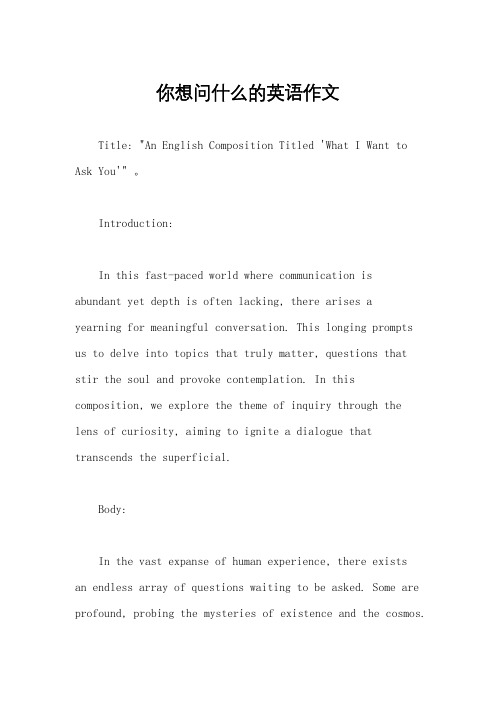
你想问什么的英语作文Title: "An English Composition Titled 'What I Want to Ask You'" 。
Introduction:In this fast-paced world where communication is abundant yet depth is often lacking, there arises ayearning for meaningful conversation. This longing prompts us to delve into topics that truly matter, questions thatstir the soul and provoke contemplation. In this composition, we explore the theme of inquiry through thelens of curiosity, aiming to ignite a dialogue that transcends the superficial.Body:In the vast expanse of human experience, there existsan endless array of questions waiting to be asked. Some are profound, probing the mysteries of existence and the cosmos.Others are personal, delving into the depths of individual identity and purpose. Yet, amidst this sea of inquiries, there are certain questions that resonate universally, transcending cultural boundaries and societal norms.One such question is: What does it mean to live a fulfilling life? This timeless inquiry lies at the heart of human existence, driving individuals to seek meaning and purpose in their daily endeavors. Is it found in thepursuit of material wealth and success, or does true fulfillment stem from nurturing meaningful relationships and contributing to the greater good? As I ponder this question, I am reminded of the words of the ancient philosopher Aristotle, who posited that eudaimonia, or human flourishing, arises from the cultivation of virtue and the pursuit of excellence. In a world consumed by consumerism and instant gratification, perhaps it is time to reevaluate our priorities and strive for a more holistic understanding of fulfillment.Another question that weighs heavily on my mind is: What role does technology play in shaping our lives? In anera dominated by smartphones and social media, it is easy to become ensnared in the digital web, losing sight of the world beyond the screen. Yet, as we marvel at the wonders of modern technology, we must also confront its darker implications. Are we sacrificing genuine human connection for the illusion of virtual intimacy? Are we becoming slaves to our devices, relinquishing control of our lives to algorithms and artificial intelligence? These are pressing questions that demand our attention as we navigate the ever-evolving landscape of the digital age.Furthermore, I find myself compelled to ask: How can we cultivate empathy and understanding in an increasingly polarized world? With political divisions widening and social tensions simmering, it is more important than ever to bridge the gap between us and them, to recognize our shared humanity amidst the cacophony of discord. Yet, achieving this lofty goal requires courage and humility, a willingness to listen to perspectives that may challenge our own preconceptions. As the saying goes, "Seek first to understand, then to be understood." Only through open dialogue and genuine empathy can we hope to overcome thebarriers that divide us and forge a path towards mutual respect and reconciliation.Conclusion:In conclusion, the art of inquiry is a powerful toolfor exploration and discovery, enabling us to transcend the limitations of our own perspectives and connect with the world around us on a deeper level. By asking questions that provoke thought and introspection, we not only expand our understanding of the world but also enrich our own lives in the process. So let us embrace curiosity as our guiding light, embarking on a journey of inquiry that leads us ever closer to truth and wisdom.。
英语作文生命中最重要的时刻
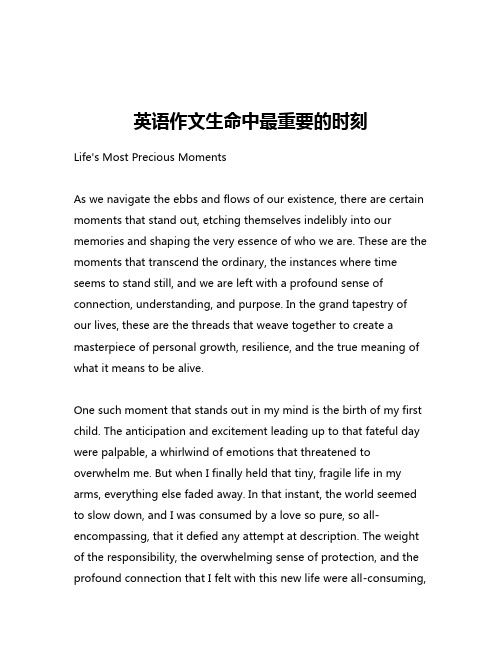
英语作文生命中最重要的时刻Life's Most Precious MomentsAs we navigate the ebbs and flows of our existence, there are certain moments that stand out, etching themselves indelibly into our memories and shaping the very essence of who we are. These are the moments that transcend the ordinary, the instances where time seems to stand still, and we are left with a profound sense of connection, understanding, and purpose. In the grand tapestry of our lives, these are the threads that weave together to create a masterpiece of personal growth, resilience, and the true meaning of what it means to be alive.One such moment that stands out in my mind is the birth of my first child. The anticipation and excitement leading up to that fateful day were palpable, a whirlwind of emotions that threatened to overwhelm me. But when I finally held that tiny, fragile life in my arms, everything else faded away. In that instant, the world seemed to slow down, and I was consumed by a love so pure, so all-encompassing, that it defied any attempt at description. The weight of the responsibility, the overwhelming sense of protection, and the profound connection that I felt with this new life were all-consuming,and in that moment, I knew that my life would never be the same.As I gazed into the eyes of my newborn child, I was struck by the realization that this was not just a moment, but a profound transformation. I was no longer just an individual; I was now a parent, a guardian, a shaper of a life that would go on to impact the world in ways I could scarcely imagine. The gravity of that realization was both humbling and empowering, and it forced me to confront my own mortality in a way I had never done before.But it was not just the birth of my child that stands out as a pivotal moment in my life. There have been other instances, equally powerful and transformative, that have left an indelible mark on my soul. The day I lost a dear friend to a tragic accident, for example, was a moment that shook me to my core. The pain and grief were overwhelming, and I found myself grappling with questions of mortality, the fragility of life, and the fleeting nature of our connections with one another.In the aftermath of that loss, I was forced to confront my own vulnerability and the realization that life can change in an instant, often without warning. It was a sobering reminder that we must cherish every moment, every interaction, and every connection, for we never know when they may be taken from us. This experience taught me the importance of living with intention, of prioritizing thepeople and relationships that matter most, and of finding ways to honor the memory of those we have lost.Another moment that stands out in my mind is the day I finally mustered the courage to pursue a long-held dream. It had been a nagging voice in the back of my mind for years, a whisper that urged me to take a leap of faith and follow my passion. But fear and self-doubt had always held me back, convincing me that I was not worthy, that I would never succeed.Yet, on that fateful day, something shifted within me. I can't pinpoint exactly what it was, but I felt a surge of courage and determination that I had never experienced before. I took a deep breath, pushed aside my fears, and took the first step towards realizing my dream. The journey was not an easy one, filled with obstacles, setbacks, and moments of doubt. But with each challenge I faced, I grew stronger, more resilient, and more committed to seeing it through.When I finally achieved my goal, the sense of accomplishment and pride was unlike anything I had ever felt. It was as if I had unlocked a new dimension of myself, a well of untapped potential that had been waiting to be unleashed. In that moment, I realized that the true value of pursuing our dreams lies not just in the end result, but in the transformative process of growth and self-discovery that occurs along the way.These are just a few of the moments that have profoundly shaped my life and my understanding of what it means to be alive. Each one has taught me something valuable, whether it's the limitless depths of love, the fragility of life, or the power of pursuing our passions. They have challenged me, transformed me, and ultimately, made me who I am today.As I reflect on these moments, I am struck by the realization that they are not just isolated events, but rather part of a larger tapestry of human experience. We all have our own stories, our own defining moments that have left an indelible mark on our lives. And it is in the sharing of these stories, the collective recognition of our shared humanity, that we find the deepest connections and the truest understanding of what it means to live a meaningful life.In the end, the most important moments in our lives are not the ones defined by external measures of success or achievement, but rather the ones that touch our hearts, challenge our perspectives, and inspire us to grow. They are the moments that remind us of our own mortality, our own vulnerability, and our own capacity for love, resilience, and transformation. And it is in the embrace of these moments, in the willingness to be fully present and to learn from them, that we find the true essence of what it means to be alive.。
拒绝写作业的小女孩英语
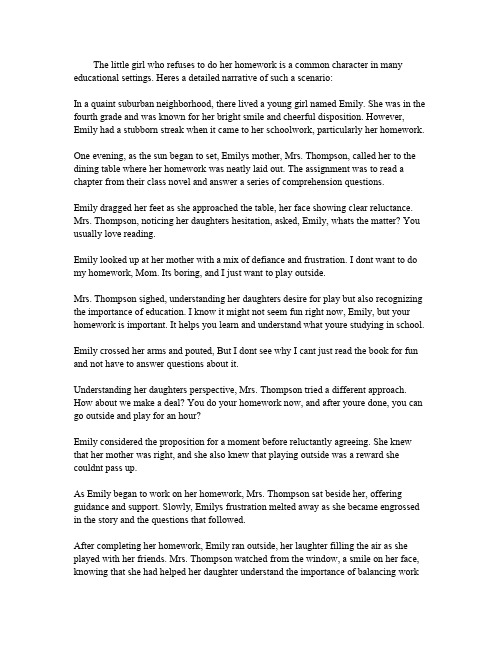
The little girl who refuses to do her homework is a common character in many educational settings.Heres a detailed narrative of such a scenario:In a quaint suburban neighborhood,there lived a young girl named Emily.She was in the fourth grade and was known for her bright smile and cheerful disposition.However, Emily had a stubborn streak when it came to her schoolwork,particularly her homework. One evening,as the sun began to set,Emilys mother,Mrs.Thompson,called her to the dining table where her homework was neatly laid out.The assignment was to read a chapter from their class novel and answer a series of comprehension questions.Emily dragged her feet as she approached the table,her face showing clear reluctance. Mrs.Thompson,noticing her daughters hesitation,asked,Emily,whats the matter?You usually love reading.Emily looked up at her mother with a mix of defiance and frustration.I dont want to do my homework,Mom.Its boring,and I just want to play outside.Mrs.Thompson sighed,understanding her daughters desire for play but also recognizing the importance of education.I know it might not seem fun right now,Emily,but your homework is important.It helps you learn and understand what youre studying in school.Emily crossed her arms and pouted,But I dont see why I cant just read the book for fun and not have to answer questions about it.Understanding her daughters perspective,Mrs.Thompson tried a different approach. How about we make a deal?You do your homework now,and after youre done,you can go outside and play for an hour?Emily considered the proposition for a moment before reluctantly agreeing.She knew that her mother was right,and she also knew that playing outside was a reward she couldnt pass up.As Emily began to work on her homework,Mrs.Thompson sat beside her,offering guidance and support.Slowly,Emilys frustration melted away as she became engrossed in the story and the questions that followed.After completing her homework,Emily ran outside,her laughter filling the air as she played with her friends.Mrs.Thompson watched from the window,a smile on her face, knowing that she had helped her daughter understand the importance of balancing workand play.In this narrative,the little girl who initially refused to do her homework learned a valuable lesson about responsibility and the benefits of education.Through patience and understanding,her mother helped guide her towards a more positive attitude towards her schoolwork.。
The questions that matter
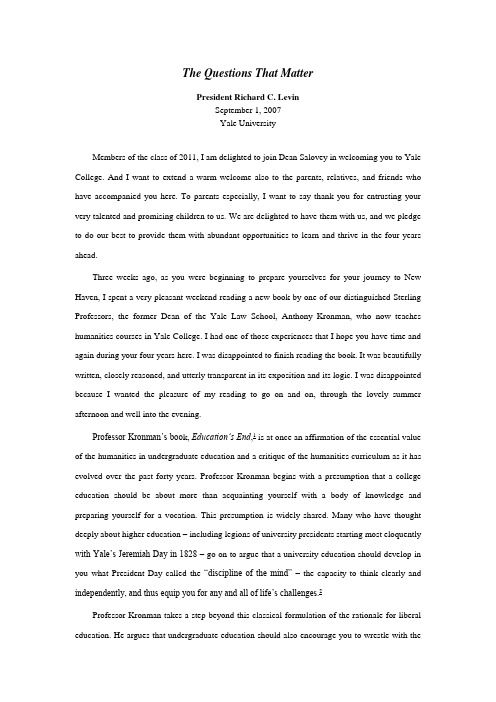
The Questions That MatterPresident Richard C. LevinSeptember 1, 2007Yale UniversityMembers of the class of 2011, I am delighted to join Dean Salovey in welcoming you to Yale College. And I want to extend a warm welcome also to the parents, relatives, and friends who have accompanied you here. To parents especially, I want to say thank you for entrusting your very talented and promising children to us. We are delighted to have them with us, and we pledge to do our best to provide them with abundant opportunities to learn and thrive in the four years ahead.Three weeks ago, as you were beginning to prepare yourselves for your journey to New Haven, I spent a very pleasant weekend reading a new book by one of our distinguished Sterling Professors, the former Dean of the Yale Law School, Anthony Kronman, who now teaches humanities courses in Yale College. I had one of those experiences that I hope you have time and again during your four years here. I was disappointed to finish reading the book. It was beautifully written, closely reasoned, and utterly transparent in its exposition and its logic. I was disappointed because I wanted the pleasure of my reading to go on and on, through the lovely summer afternoon and well into the evening.Professor Kronman’s boo k, Education’s End,1 is at once an affirmation of the essential value of the humanities in undergraduate education and a critique of the humanities curriculum as it has evolved over the past forty years. Professor Kronman begins with a presumption that a college education should be about more than acquainting yourself with a body of knowledge and preparing yourself for a vocation. This presumption is widely shared. Many who have thought deeply about higher education – including legions of university presidents starting most eloquently with Yale’s Jeremiah Day in 1828 – go on to argue that a university education should develop in you what President Day called the “discipline of the mind” –the capacity to think clearly and independently, and thus equip you for any and all of life’s challenges.2Professor Kronman takes a step beyond this classical formulation of the rationale for liberal education. He argues that undergraduate education should also encourage you to wrestle with thedeepest questions concerning lived experience: What constitutes a good life? What kind of life do you want to lead? What values do you hope to live by? What kind of community or society do you want to live in? How should you reconcile the claims of family and community with your individual desires? In short, Professor Kronman asserts that an important component of your undergraduate experience should be seeking answers to the questions that matter: questions about what has meaning in life.Professor Kronman then divides the history of American higher education into three periods, and he argues that the quest for meaning in life was central to the university curriculum during the first two, but no longer. In the first period, running from the founding of Harvard in 1636 to the Civil War, the curriculum was almost entirely prescribed. At its core were the great literary, philosophical and historical works of classical Greece and Rome, as well as classics of the Christian tradition –from the Bible to the churchmen of late Antiquity and the Middle Ages to Protestant theologians of the Reformation and beyond. In the minds of those who established Harvard and Yale and the succession of American colleges that were founded by their graduates, the classics were the ideal instruments, not only for developing the “discipline of the mind,” but also for educating gentlemen of discernment and piety. In this era, Kronman argues, the proposition that education was about how to live a virtuous life was never in doubt. Through their mastery of the great texts, the faculty, each of whom typically taught every subjec t in the curriculum, were believed to possess authoritative wisdom about how to live, and they believed it their duty to convey this wisdom to their students.After the Civil War the landscape of American higher education changed dramatically, as new institutions like Johns Hopkins, Cornell, and the University of California took German universities as their model. For the first time, the advancement of knowledge through research, rather than the intergenerational transmission of knowledge through teaching, was seen to be the primary mission of higher education. As faculty began to conceive of themselves as scholars first and teachers second, specialization ensued. No longer did everyone on the faculty teach every part of a prescribed curriculum; instead the faculty divided into departments and concentrated their teaching within their scholarly disciplines.Amidst this transformation, explicit discussion of the question of how one should live was more or less abandoned by the natural and social sciences and left to the humanities. Humanists, like scientists, became specialists in their scholarship, but they recognized that the domain of their expertise, the great works of literature, philosophy and history –modern as well as classical –raised, argued, and re-argued the central questions about life’s meaning. And they continued to see their role as custodians of a tradition that encouraged young people to grapple with these questions as a central part of their college experience. But humanities professors no longer had the moral certainty of their predecessors. They saw the great works of the past not as guidebooks to becoming a steadfast and righteous Christian, but rather as part of a “great conversation” about human values, offering alternative models of how one should live, rather than prescribing one true path. Engagement with the “great conversation” remained an important component of college education in the century between the Civil and Vietnam Wars, a period which Kronman labels the era of “secular humanism.”Kronman goes on to argue that since the 1960s, the tradition of secular humanism has been eroded –he would even say defeated –by two forces. The first of these forces is a growing professionalization, discouraging humanists from offering authoritative guidance on the questions of value at the center of the “great conversation.” The second is politicization, challenging the view that the voices and topics engaged in the “great conversation” of western civilization have any special claim to our attention and arguing for increased focus on the voices and topics, western and non-western, that have been excluded from the western canon.Kronman’s argument about the contemporary state of the humanities will be welcomed by some and met with fierce resistance from many others. But the inevitable controversy about the current state of the humanities should not obscure for us this most important point: that the question of how you should live should be at the center of the undergraduate experience, and at the center of your Yale College experience.The four years ahead of you offer a once-in-a-lifetime opportunity to pursue your intellectual interests wherever they may lead, and, wherever they may lead, you will find something to reflect upon that is pertinent to your quest for meaning in life. It is true that your professors are unlikely to give you the answers to questions about what you should value and how you should live. Weleave the answers up to you. But I want to make very clear that we encourage you to ask the questions, and, in seeking the answers, to use the extraordinary resources of this place – a brilliant and learned faculty, library and museum resources that are the equal of any campus anywhere, and curious and diverse classmates who will accompany you in your quest.Because of their subject matter, the humanities disciplines have a special role in inspiring you to consider how you should live. But I also want to suggest to each of you that questions that bear on the shaping of your life will arise in whatever subjects you choose to study. You will find that virtually every discipline will provide you with a different perspective on questions of value and lead you to fresh insights that will illuminate your personal quest.Your philosophy professors, for example, aren’t likely to teach you the meaning of life, but they will train you to reason more rigorously and to discern more readily what constitutes a logically consistent argument and what does not. And they will lead you through texts that wrestle directly with the deepest questions of how to live, from Plato and Aristotle to Kant and Nietzsche and beyond.Your professors of literature, music, and art history will not tell you how to live, but they will teach you to read, listen, and see closely, with a keener appreciation for the artistry that makes literature, music, and visual art sublime representations of human emotions, values, and ideas. And they will lead you through great works that present many different models of how, and how not, to lead a good life.Neither will your professors of history instruct you on the values that you should hold most close, but, by giving you an appreciation of the craft of reconstructing the past, they will lead you to understand how meaning is extracted from experience, which may help you to gain perspective on your own experience. And history, too, provides models of how one should, and should not, live.In your effort to think through how you wish to live and what values matter most to you, you will find that challenging questions arise not only in the humanities. Long ago, I taught introductory economics in Yale College. I always began by telling the students that the course would change their lives. I still believe this. Why? Because economics will open you to an entirely new and different way of understanding how the world works. Economics won’t prescribe for youhow society should be organized, or the extent to which individual freedom should be subordinated to collective ends, or how the fruits of human labor should be distributed – at home and around the world. But understanding the logic of markets will give you a new way to think about these questions, and, because life is lived within society and not in abstraction from it, economics will help you to think about what constitutes a good life.Dean Salovey has already given you some insights gleaned from his study as a professor of psychology. His discipline probes many fundamental questions. What is the relationship between your brain and your conscious thoughts? To what extent is your personality – both in its cognitive and emotional dimensions –shaped by your genetic make-up, your past experiences, and your own conscious decisions. The answers to these questions have an obvious bearing on the enterprise of locating meaning in life.Your biology and chemistry professors will not tell you how to live, but the discoveries made in these fields over the last century have already extended human life by twenty-five years in the United States. As the secrets of the human genome are unlocked and the mechanisms of disease uncovered, life expectancy may well increase by another decade or two. You may want to ponder how a longer life span might alter your thinking about how to live, how to balance family and career, and how society should best be organized to realize the full potential of greater human longevity.Finally, it is at the core of the physical sciences that one finds some of the deepest and most fundamental questions relating to the meaning of human experience. How was the physical universe created? How long will it endure? And what is the place of humanity in the order of the universe?For the next four years, each of you has the freedom to shape your life and prepare for shaping the world around you. You will learn much about yourself and your capacity to contribute to the world not only from your courses, but also from the many friends you make and the rich array of extracurricular activities available to you. Your courses will give you the tools to ask and answer the questions that matter most, and your friendships and activities will give you the opportunity to test and refine your values through experience.Let me warn you that daily life in Yale College is so intense that it may sometimes seem that you have little time to stop and think. But, in truth, you have four years – free from the pressures of career and family obligations that you will encounter later – to reflect deeply on the life you wish to lead and the values you wish to live by. Take the time for this pursuit. It may prove to be the most important and enduring accomplishment of your Yale education.Welcome to Yale College.1 Anthony T. Kronman, Education’s End: Why Our Colleges and Universities Have Given Up on the Meaning of Life, New Haven and London: Yale University Press, 2007.2 Reports on the Course of Instruction in Yale College. New Haven: The Yale Corporation, 1828, p. 7.。
公共英语三级模拟201
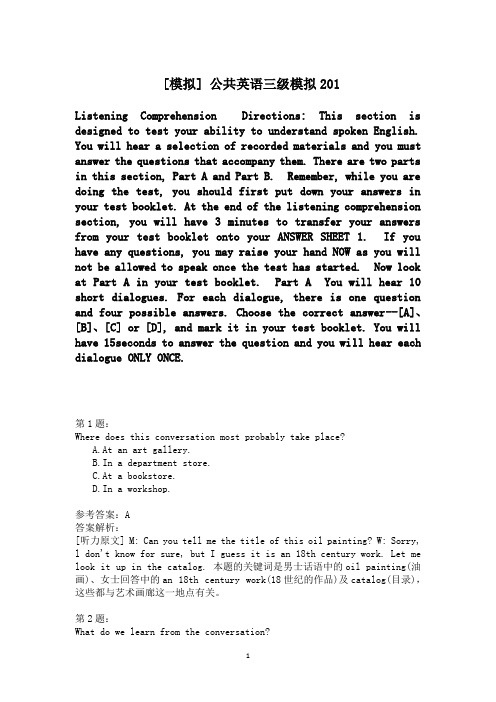
[模拟] 公共英语三级模拟201Listening Comprehension Directions: This section is designed to test your ability to understand spoken English. You will hear a selection of recorded materials and you must answer the questions that accompany them. There are two parts in this section, Part A and Part B. Remember, while you are doing the test, you should first put down your answers in your test booklet. At the end of the listening comprehension section, you will have 3 minutes to transfer your answers from your test booklet onto your ANSWER SHEET 1. If you have any questions, you may raise your hand NOW as you will not be allowed to speak once the test has started. Now look at Part A in your test booklet. Part A You will hear 10 short dialogues. For each dialogue, there is one question and four possible answers. Choose the correct answer--[A]、[B]、[C] or [D], and mark it in your test booklet. You will have 15seconds to answer the question and you will hear each dialogue ONLY ONCE.第1题:Where does this conversation most probably take place?A.At an art gallery.B.In a department store.C.At a bookstore.D.In a workshop.参考答案:A答案解析:[听力原文] M: Can you tell me the title of this oil painting? W: Sorry, l don't know for sure, but I guess it is an 18th century work. Let me look it up in the catalog. 本题的关键词是男士话语中的oil painting(油画)、女士回答中的an 18th century work(18世纪的作品)及catalog(目录),这些都与艺术画廊这一地点有关。
- 1、下载文档前请自行甄别文档内容的完整性,平台不提供额外的编辑、内容补充、找答案等附加服务。
- 2、"仅部分预览"的文档,不可在线预览部分如存在完整性等问题,可反馈申请退款(可完整预览的文档不适用该条件!)。
- 3、如文档侵犯您的权益,请联系客服反馈,我们会尽快为您处理(人工客服工作时间:9:00-18:30)。
2011级的全体学员们,我很高兴有幸加入萨洛韦院长的队伍,对你们的到来表示欢迎。
除此之外,我要向陪你们来的父母,亲人和朋友们表示欢迎。
着重要感谢一下各位学生的父母,感谢你们的信任将你们优秀的孩子交付给我们。
我很高兴他们加入我们的耶鲁大家庭,在此我保证在未来的四年里,我们会尽全力向他们提供学习成长的机会。
三周之前,当你们开始准备到黑文市之旅的时候,我花了一周的时间拜读了我们敬爱的Sterling教授和克鲁曼的著作,在此期间,收起匪浅,愉快至极。
我所提到的Sterling教授是耶鲁法学院的前院长,而克鲁曼教授现任耶鲁大学的人文科学教授。
我希望在你们的大学生活中能有机会和我一样感同身受:当我读完整本书时,我十分的沮丧。
这本书文笔优美,论述详尽,表述和逻辑都浅显易读。
我之所以沮丧的原因是因为我想一直读下去,享受阅读带给我的乐趣,这种乐趣始于盛夏午后贯穿整个下午。
克鲁曼教授的《教育的终结》一书中,对大学生教育中的人文学科的必要价值做出了论断,并且对过去40余年中人文学科的课程演化进行了抨击。
克鲁曼教师的理论来源是:教育工作者对于一所大学教育的熟知程度应该高于熟悉自己的身体机理的认知程度,并时刻准备着投身于自己的使命中去。
如今,这个理论已经受到了广泛的认同。
包括自1828年最富口才的Jeremiah Day校长开始的很多大学校长,都会更高层次的教育进行了深思,他们就大学教育是否应该将“校长日”定义为“哲学思想”产生了争论。
清晰独立思考的能力会是你不受任何外物的干扰,面对人生中的挑战全副武装勇敢而战。
克鲁曼教授这一理论是自由教育原理的典型框架。
他表示大学教育应该鼓励学生努力解决人生阅历的问题:美好的生活由什么组成?你想要什么样的生活?你想持有什么样的价值观?你想存在于什么样的团体社会当中?你怎样协调家庭生活,社会生活和个人生活?简言之,克鲁曼教授断定,在对这些重要问题答案的寻觅过程中,大学生的生活阅历会逐渐累积,这才是最为重要的一部分。
而这个重点问题就是:生活的意义究竟何在!
接下来的这四年里,这一生值此一次的机会回让你来追求你的兴趣所在,你可能引领你兴趣的走向,也可能被兴趣牵引,之后你就会发现你所探求的生命意义。
当你向教授问询人应该怎么实现价值,应该怎样去生活的时候,他们不会给你答案。
我们将会把这问题的答案留给你自己去探寻。
但我要在此重申,我们鼓励你们提问题,然后根据问题找寻你们想要的答案,在此过程中,你们可以利用这里绝好的资源,一流的勤恳的全体教员,校园各处都遍布的图书馆和博物馆,在你探索路上陪伴着你的形形色色的朋友们。
人文学科因其学科的重要饰演着一个特别的角色,就是鼓励你去思考要怎样生活。
但是我这里还要提醒你们,你们中的每一个人都要承受住生活的打压,因为这会帮助你们更好地学习。
事实上,每项训练都会在价值问题上给你们不同的启示,并革新你们的眼界,使你们个人探求变得更加明朗。
举例来说,你们的心理学教授不会告诉你们人生的意义,但是他们会训练你们更为严格的论证,更加迅速准确的判断是否要进行逻辑争论。
除此之外,他们会引导你们发掘“怎样生活的更深层次”的话题,从柏拉图到亚里士多德,从康德到尼采等等。
你们的文学教授,音乐教授,艺术历史教授都不会告诉你们怎样去生活,但是他们会叫你认真的读,听,看。
使你们满怀热忱之情发掘到艺术才能,使你们的艺术以一种高尚的情操来表达人类的情感价值和理念。
除此之外,他们还会指导你们的所有作品,使你以最恰当的模式塑造自己,成就优质的生活。
当你努力思考着,你希望怎样生活,对你来说最重要的价值在哪儿的时候,你将会发现那些极具挑战性的问题不仅仅只出现在人文学科的课堂上。
很久之前,我在耶鲁大学教授基础经济学。
每次在课程刚开始的时候,我总会告诉学生们,这课程将会改变他们的一生。
我现在仍然坚信着句话。
为什么?因为经济学会以一个不同的方式将这个世界展示给你。
经济学不仅仅只是规定了社会社会的组织形式,抑或个
体自由应从属于集体利益,又抑或是人类的劳动成果的分配问题:是个人独享还是集体共享?对于市场逻辑的了解将会给你认识这些问题打开一扇全新的大门,因为生活绝不独立于社会存在,也并非社会的一种抽象存在。
经济学将会帮助你思考到底是什么构成了美好生活。
生物教授和化学教授也不会告诉你该怎样生活,但是在这个生化这个领域的发现美国已经持续了近25年。
当人类基因组的秘密被揭晓,继而发现了疾病机制时,人类的生命周期就增加了十年甚至二十年。
你可能会想到更长的生命周期会改变你生活的固有想法,怎样平衡家庭和事业的关系?社会应该怎样协调才能实现人类更长的生命周期中的最大潜能。
最后,我们来到了核心的物理科学,它发现了最深层次最基础的课程相对于人类进步的意义。
物理科学是怎样被创造出来的呢?它是怎样持续发展的呢?对于宇宙来说,人文学科的地位是怎样的呢?
在接下来的四年中,你们每一个人都有自由塑造你自己的生活并为之做准备。
你将会更加了解你自己,你的能力将会对世界做出贡献,而这贡献不仅仅来自于你学习的课程,同样来来自于和你完成大量活动的朋友们。
你的所学将会在你寻求问题答案时为你提供必要工具,而你的友谊和活动将会给通过一次次历练来检验增加你的人生价值。
让我对你们在耶鲁大学的日常生活提前做个预警吧,生活节奏会快到你几乎没有时间停止或思考。
但是事实上,这四年的时间你不必承受即将到来的事业压力和家庭责任。
这四年将会生动反映出你的生活预期和你为何种价值期望而生活。
请于这种追寻中享受生活吧。
它将会向你证明耶鲁教育是最为重要而持久的成就。
欢迎来到耶鲁大学!。
